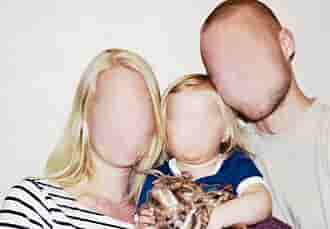
Face Blindness – It’s More Common Than You Think.
Prosopagnosia, also known as face blindness, is a cognitive disorder that is characterized by the inability to recognize the faces of familiar people, or the struggle to interpret facial expressions and cues. The image above is a computer-enhanced fMRI scan showing the increased blood flow in the visual cortex area of a person who has been asked to look at faces.
According to the WebMD website, “Most people with prosopagnosia are born with it. They’ll continue to have the condition throughout most or all of their lives. It can greatly affect your daily schedule. In severe cases, you may not be able to quickly recognize your family members, close friends, or partner.” There currently is no known cure for the disorder.
Facial recognition cases can range from mild to severe, making it a real challenge for many people who live with this disorder. The more severe cases can affect your family life or your ability to hold a job; and may cause an individual to completely withdraw from society, staying home to eliminate the potential for embarrassment or humiliation.
What‘s Going On?
Prosopagnosia has nothing to do with your actual vision, you can see the other person’s face quite clearly, people with Face Blindness have difficulty processing information related to ‘who’ the person is. It’s clearly a problem the brain has with processing the details, the facial recognition key points that we all see, and finding a match in your stored memory.

It’s not so much a problem with their memory, they remember the past as well as anyone. As one patient described it, “It’s not a memory thing, the memory never gets created, the face doesn’t get filed.” They can’t locate the memory because it isn’t there. In milder cases of face blindness you can build that memory over time, severe cases never do create a memory.
In extreme cases, there are those who can’t recognize themselves in a mirror. Think about that, when you look in the mirror you don’t recognize that person; how disorienting that must be. When it comes to daily social interactions it’ must be like Bill Murray in Groundhog Day, you start over every day. The vast majority of cases are not considered severe.
In the United States, prosopagnosia affects about one in 30,000 people. Many people, myself included (until recently) never know they have a cognitive disorder. They may be aware they have an issue with recognizing friends and coworkers, but they just blow it off, believing they have a bad memory; when what they really have is no memory.

My Experience With Prosopagnosia
I have had issues identifying people I’ve recently met for most of my adult life. My condition would be considered mild, as I’ve never had a problem recognizing my family members or close friends ( with a few exceptions). Over time you learn to hide, or distract from the issue by making jokes like “Sorry, I guess I’m getting old”, or “I thought you looked familiar”.
It’s been about two years now since I discovered that the issue I have with identifying faces is an actual medical condition, and that it is not just a case of bad memory. Oddly, about a year earlier I had come to the conclusion that I was mildly autistic, which helped me to understand some of the other awkward social situations I’ve experienced in my life.
According to Elemy.com, a website that guides and empowers families to live beyond an autism diagnosis, “Face Blindness, or Prosopagnosia, is a condition that can be acquired through a brain injury, but it is also closely associated with developmental disorders like Autism. About 40% of people with autism have prosopagnosia symptoms.” I am one of them.

I’m 70 years old and only recognized this ailment for what it was two years ago. That’s a long time to suffer from an unknown illness. It didn’t ruin my life, but it did, at times, make it difficult. I can honestly say I’m grateful my situation wasn’t more severe. In my case, Prosopagnosia was certainly an inconvenience and a little humiliating, but it wasn’t devastating.
Face Blindness can be embarrassing at times. I remember walking right by my neighbors of twelve years in an aisle-way at Walmart. I looked right at them, and as I passed them Robert said “Hey neighbor”, causing me to stop. As soon as I heard his voice I knew it was my neighbors and struck up a short conversation.
The strange part is that I’ve had dozens of conversations with Robert in our hallway and the parking lot over the years, you would think I would recognize him. The problem was that it was a different setting, away from our apartment building, and I couldn’t make the connection. I never had the problem at home, I always knew who he was.
I’ve had the same problem in my new home. I’m now in a high-rise, on the 10th floor. I’ve lived here for three years. I recognize everyone on my floor now, but it took well over six months to reach this point. However, if I were to see one of them in a different setting, like the park or a grocery store, I’m not confident I would easily recognize them.
Even though my situation is an inconvenience, it’s not the end of the world. It’s all I’ve known, my whole life has been this way, I’ll get by. At least there is some comfort in the fact I now know what’s causing this facial blindness issue and that it‘s not caused by a lack of memory. I just have to accept it for what it is and move on.
You can learn more about this little known cognitive disorder by watching this excellent short clip on Prosopagnosia by 60 minutes.
On Reflection
Not much more I can say about this post, it speaks for itself. I learned to live with this disorder long before I knew what it was. It helps to be able to understand my situation and explain my condition to others rather than make stupid jokes about my ‘bad memory’. Hopefully this blog may help someone else understand their ‘memory loss’ situation as well.
If you suffer from this ailment, or know someone who does, please share your feelings in the comment section below.
Thanks for reading my article.
Info Sources: In addition to my personal experience, most ‘researched’ information was gathered from the websites noted below and various Google searches.
- To learn more about this devastating disorder visit the WebMD website concerning Prosopagnosia.
- Visit the Cleveland Clinic website for info about Prosopagnosia
- For more info about Face Blindness check out this recent Harvard Medical School Study here.
- *Public Domain WikiMedia image used with permission via Creative Commons License BY-SA 3.0 Deed and/or BY-SA 4.0 Deed





Leave a Reply